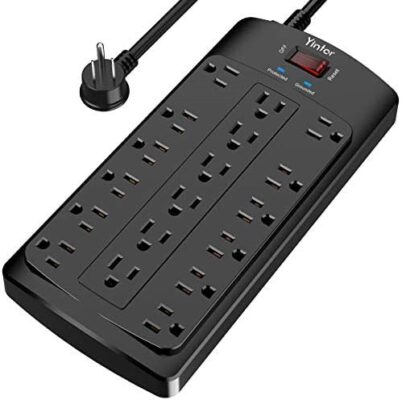Tips for buying a surge protector
Surge protectors are essential devices that can protect your electronic equipment from power surges, spikes, and other electrical disturbances. These devices act as a buffer between your electrical devices and the power source, absorbing excess voltage and preventing damage. In this article, we will provide a detailed definition of surge protectors, the key types of surge protectors, and the points to consider when buying a surge protector.
What is a surge protector
A surge protector is an electrical device designed to protect electrical equipment from voltage spikes or surges in the electrical supply. These surges can damage sensitive electronic devices, such as computers, home theatre systems, and other electrical equipment. Surge protectors are often used in conjunction with other protective devices, such as circuit breakers and fuses, to protect electrical equipment from power surges and other electrical disturbances.
(Phot Credit: Amazon)
Key Types of Surge Protectors
Basic Surge Protector

A basic surge protector is the most common type of surge protector available on the market. It usually comes in a power strip format and can protect multiple devices. It has a basic protection rating and typically includes a fuse or a circuit breaker.
Battery Backup Surge Protector

This type of surge protector is also known as a UPS (Uninterruptible Power Supply). It not only provides surge protection but also provides backup power for your devices in case of a power outage. This type of surge protector is particularly useful for sensitive electronic devices that need to be kept running in case of power failure.
Whole-House Surge Protector
As the name suggests, a whole-house surge protector is designed to protect your entire house from power surges. It is installed at the main electrical panel of your house and can protect all electrical devices connected to the house’s wiring.
Surge Protector Extension Cords
Surge protector extension cords are similar to basic surge protectors, but they come in the form of an extension cord. They are convenient to use and can provide protection to multiple devices. They are ideal for home use, particularly when you need to use multiple electrical devices in one area.
Tips for buying a surge protector
Joule Rating
The joule rating of a surge protector determines how much energy it can absorb before it fails. Look for surge protectors with a high joule rating, as they will be able to protect your equipment from more significant power surges.
Clamping Voltage
Clamping voltage is the voltage at which the surge protector will start to clamp or limit the voltage. Look for a surge protector with a low clamping voltage, as it will be able to respond more quickly to voltage spikes.
Number of Outlets
The number of outlets on a surge protector will determine how many devices it can protect. Make sure you choose a surge protector with enough outlets to protect all of your electronic devices.
Response Time
The response time of a surge protector is the time it takes for it to respond to a power surge. Look for surge protectors with a fast response time, as they will be able to protect your equipment more quickly.
Brand
Choose a surge protector from a reputable brand. Brands that have been in the industry for a long time have a better understanding of how surge protection works and are more likely to produce quality products.
Warranty
Look for a surge protector with a warranty. A warranty will provide you with peace of mind, knowing that your surge protector is covered if it fails.
In conclusion, a surge protector is an essential device that can protect your electronic equipment from power surges, spikes, and other electrical disturbances.
Comparison of Key Types of Surge Protectors
| Criteria | Basic Surge Protector | Battery Backup Surge Protector | Whole House Surge Protector | Surge Protector Extension Cord |
|---|---|---|---|---|
| Definition | Provides basic protection from power surges | Provides battery backup during power outages | Protects entire house from power surges | Provides protection from power surges for multiple devices |
| Joules Rating | 200-6000 joules | 1000-3000 joules | 60000 joules | 400-3000 joules |
| Clamping Voltage | 400V-800V | 330V-800V | N/A | 400V-800V |
| Voltage Protection Rating | 120V-240V | 120V-240V | 120V-240V | 120V-240V |
| Indicator Lights | Basic LED indicator lights | LED lights for battery, overload, and wiring faults | LED lights for power, ground, protection, and wiring faults | LED indicator lights for power, ground, and protection |
| Battery Backup Time | N/A | 5-30 minutes depending on battery capacity | N/A | N/A |
| Price | Low to medium range | Medium to high range | High range | Low to medium range |
| Suitable for Home Use | Yes, for basic protection | Yes, for protection during power outages | Yes, for comprehensive protection | Yes, for protecting multiple devices |
| Suitable for Business Use | Yes, for basic protection | Yes, for protection during power outages and data loss prevention | Yes, for comprehensive protection of electronic equipment | Yes, for protecting multiple devices in an office environment |
| UL Certification | UL 1449 | UL 1449 and UL 1778 for battery backup models | UL 1449 and UL 1283 for wiring | UL 1449 |
Note: Joules rating refers to the amount of energy a surge protector can absorb before it fails. Clamping voltage refers to the voltage that triggers the surge protector to activate and divert the surge to ground. Voltage protection rating refers to the maximum voltage that the surge protector can handle.
FAQs
What is a surge protector and why do I need one?
A surge protector is a device that protects your electronic devices from sudden power surges and voltage spikes. It is essential to use a surge protector to prevent your expensive electronics from getting damaged due to power fluctuations.
Can I plug a surge protector into another surge protector?
It is not recommended to plug one surge protector into another. Doing so can cause overloading and overheating, leading to a fire hazard.
How many joules should a surge protector have?
The joule rating of a surge protector should be at least 600 joules for basic protection. However, for more robust protection, it is recommended to use a surge protector with a higher joule rating, such as 1000 joules or more.
Can a power strip be used as a surge protector?
Not all power strips have surge protection. It is important to check the label or packaging of the power strip to see if it has surge protection. If it does not, it will not protect your electronics from power surges.
How often should I replace my surge protector?
Surge protectors have a limited lifespan and should be replaced every two to three years, or after a major power surge. It is important to regularly check your surge protector for any signs of wear and tear.
Can surge protectors save my electronics from lightning strikes?
While surge protectors can protect your electronics from power surges caused by lightning, they cannot protect them from a direct lightning strike. It is recommended to unplug your electronics during a thunderstorm to avoid any potential damage.
You might also be interested in:
Types of Nails & how to choose
Types of Sealants for DIY Projects
Thank you for reading. I hope you enjoyed the article – Tips for buying a surge protector. Please share it with your friends and family. If you have any comments or suggestions, please comment below. You can also follow us on Facebook, Instagram, and Twitter. Do not forget to give us a LIKE or SUBSCRIBE.
——————————————————————————————————————————————
Homecazt is a home & garden Magazine. We provide practical tips, ideas and inspirations. Our comprehensive collection of articles, tips, and ideas can help you transform every room in your home, and create a beautiful, functional, and stylish space. The articles published in our magazine are intended to provide general information and ideas related to home decor, home improvement, gardening, and related topics. We strive to provide accurate and up-to-date information, but readers should always conduct their own research and consult with professionals before undertaking any home decor, home improvement or gardening projects. Our magazine accepts no liability for any damages or losses that may result from the use of information presented in our articles.




